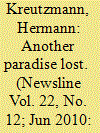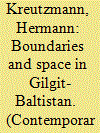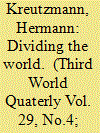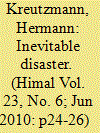| Srl | Item |
| 1 |
ID:
095854


|
|
|
| 2 |
ID:
142472


|
|
|
|
|
| Summary/Abstract |
Boundary-making in the Karakoram–Himalayan borderlands has found a diverse set of actors and expressions over time. Legacies from colonial borders are part of contemporary disputes about affiliation, participation, and space. Three aspects are addressed in this paper: first, the debate about ‘natural’ and ‘scientific’ boundaries for purposes of colonial territorial acquisition; second, postcolonial debates in the recent renaming game in Gilgit-Baltistan and its implications; and third, the attitudes of actors in exile and geopolitical players claiming to represent the aspirations of the inhabitants of Gilgit-Baltistan. The three perspectives reveal opportunities and constraints in border regimes that reflect power structures, internal and external modes of interference, and participation.
|
|
|
|
|
|
|
|
|
|
|
|
|
|
|
|
| 3 |
ID:
082010


|
|
|
|
|
| Publication |
2008.
|
| Summary/Abstract |
The central themes in development theory have addressed exclusion of social groups, poverty gaps and strategies to overcome development deficits. In order to perceive the spatial structuring of inequality, concepts defining three separate worlds found ubiquitous appreciation and omnipresent adaptation. Coinciding with the end of the Cold War the 'endism' debate also suggested the end of the 'Third World'. Presently it has become apparent that development theories which have ordered global space into three different worlds are experiencing rejuvenated appreciation. Nevertheless, the recourse towards trichotomising the world is not necessarily stimulated by the same concepts as previously. In the era of globalisation and post-developmentalism concepts favouring nation-states as sole reference points have been challenged and criticised, although the debate about failed states has again drawn attention to those entities. The post-9/11 perception of world order, chaos and conflicts has structured the previously acknowledged limitation of resources and the impossibility of catching-up strategies for developing countries in such a manner that 'new' Third World theories point at the exclusion from the developed world of outsiders, by attributing them pre-modern levels of state development and sovereignty. A prominent result of this debate is a perception of ordered space along lines which seemed to have been abandoned some time ago. This paper compares and scrutinises contemporary concepts of dividing the world
|
|
|
|
|
|
|
|
|
|
|
|
|
|
|
|
| 4 |
ID:
095787


|
|
|